Mark Twain writes about MAORI of New Zealand
Following the Equator
Page 115
CHAPTER XXXV.
The Autocrat of Russia possesses more power than any other man in the earth; but he cannot stop a sneeze. --Pudd'nhead Wilson's New Calendar.
WAUGANIUI, December 3. A pleasant trip, yesterday, per Ballarat Fly. Four hours. I do not know the distance, but it must have been well along toward fifty miles. The Fly could have spun it out to eight hours and not discommoded me; for where there is comfort, and no need for hurry, speed is of no value--at least to me; and nothing that goes on wheels can be more comfortable, more satisfactory, than the New Zealand trains. Outside of America there are no cars that are so rationally devised. When you add the constant presence of charming scenery and the nearly constant absence of dust--well, if one is not content then, he ought to get out and walk. That would change his spirit, perhaps? I think so. At the end of an hour you would find him waiting humbly beside the track, and glad to be taken aboard again.
Much horseback riding, in and around this town; many comely girls in cool and pretty summer gowns; much Salvation Army; lots of Maoris; the faces and bodies of some of the old ones very tastefully frescoed. Maori Council House over the river-large, strong, carpeted from end to end with matting, and decorated with elaborate wood carvings, artistically executed. The Maoris were very polite.
I was assured by a member of the House of Representatives that the native race is not decreasing, but actually increasing slightly. It is another evidence that they are a superior breed of savages. I do not call to mind any savage race that built such good houses, or such strong and ingenious and scientific fortresses, or gave so much attention to agriculture, or had military arts and devices which so nearly approached the white man's. These, taken together with their high abilities in boat-building, and their tastes and capacities in the ornamental arts modify their savagery to a semi-civilization--or at least to, a quarter- civilization.
It is a compliment to them that the British did not exterminate them, as they did the Australians and the Tasmanians, but were content with subduing them, and showed no desire to go further. And it is another compliment to them that the British did not take the whole of their choicest lands, but left them a considerable part, and then went further and protected them from the rapacities of landsharks--a protection which the New Zealand Government still extends to them. And it is still another compliment to the Maoris that the Government allows native representation--in both the legislature and the cabinet, and gives both sexes the vote. And in doing these things the Government also compliments itself; it has not been the custom of the world for conquerors to act in this large spirit toward the conquered.
The highest class white men Who lived among the Maoris in the earliest time had a high opinion of them and a strong affection for them. Among the whites of this sort was the author of "Old New Zealand;" and Dr. Campbell of Auckland was another. Dr. Campbell was a close friend of several chiefs, and has many pleasant things to say of their fidelity, their magnanimity, and their generosity. Also of their quaint notions about the white man's queer civilization, and their equally quaint comments upon it. One of them thought the missionary had got everything wrong end first and upside down. "Why, he wants us to stop worshiping and supplicating the evil gods, and go to worshiping and supplicating the Good One! There is no sense in that. A good god is not going to do us any harm."
The Maoris had the tabu; and had it on a Polynesian scale of comprehensiveness and elaboration. Some of its features could have been importations from India and Judea. Neither the Maori nor the Hindoo of common degree could cook by a fire that a person of higher caste had used, nor could the high Maori or high Hindoo employ fire that had served a man of low grade; if a low-grade Maori or Hindoo drank from a vessel belonging to a high-grade man, the vessel was defiled, and had to be destroyed.
Mark Twain

MAORI BATTALION, TROCCHIO, ITALY
With a cheery farewell grin they had marched off armed to the teeth, festooned with Spandaus, Schmeissers, Brens, tommy-guns, carbines and the odd rifle. I had never before seen such a body of men so completely armed with automatic weapons. The Maori seemed to have a natural aptitude for automatics. Most of them could play a tune on a tommy gun, and being rugged specimens physically, the extra weight did not greatly distress them. They were a piratical looking crew, swathed in greatcoats and balaclavas topped by battered tin hats, creaking in their harness with necklaces of Spandau belts and bandoliers slung about them. They had gone down to the road and swung into a staggered formation with an ominous clicking of cocking handles and a bristle of gun barrels.
Maori Warriors Show Italians Feared ReputationBy Selwyn Manning,
Mist lay heavy about the hills surrounding the Monte Cassino War Cemetery today as a cultural clash marred events commemorating the 60th anniversary of the Battle of Monte Cassino.
The New Zealand Defence Forces Maori cultural group has lived up to fearsome reputations here in Italy after a Maori warrior pushed a woman taking video footage while he cleared the way during cultural ceremony. The woman was shoved out of the way as the official party moved toward taking seats fronting a monument to those killed in World War II.
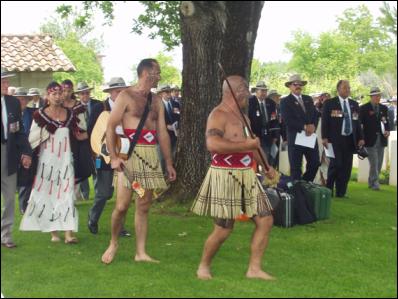
In a later incident leader of the cultural group, Mark Pirikahu, shoved an Italian photographer off what was considered sacred ground.
Two veterans of the famous battle of 1944 called out to the warriors to ‘behave yourselves’. Many Italian observers were fearful that harm was about to descend upon what was a peaceful ceremony.
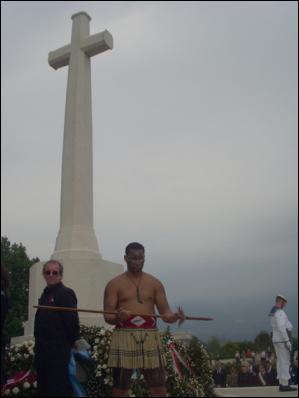
Later New Zealand Prime Minister Helen Clark said the incident was unfortunate: “Sometimes the group is very focused on what it is doing, and do not see people in the way.”
“I can see they were very concerned that some of the Italian press were on what they considered sacred ground to New Zealanders.”
During such ceremony the Maori warriors represent their ancestors, elders, and those spirit of those gone. There are strict guidelines within Maori protocol that insist outsiders respect the sanctity of the ground that they are spiritually clearing.
Helen Clark said the area of land around where wreaths were laid was particularly sacred to Maori, who had lost many when the Maori 28th Battalion fought in Cassino in 1944.
“I understand that the leader of the party was defending what they consider sacred ground and I think many of the veterans would feel that too,” Helen Clark said.
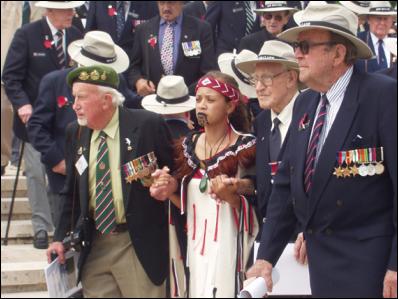
New Zealand Defence Force head Air Marshal Bruce Ferguson defended the actions. He said it was justified because the photographer had gone onto sacred ground in the middle of the ceremony to take photos.
A German ceremony marking the anniversary saw two former New Zealand soldiers give the Nazi salute. Helen Clark said the insult was “most unfortunate” but added: “many of the veterans have been spending time with the Germans, they have had a beer together. They have put it behind them.”
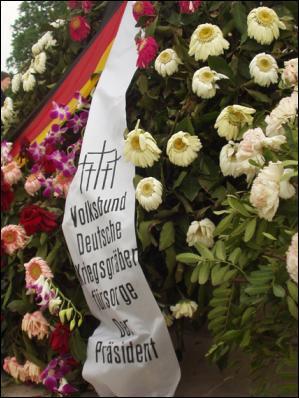
Wreath laid by the Government of Germany.
She added that many of the Germans who fought in World War II were “just ordinary people who were conscripted to fight for their country without any options. And I guess it was with those ordinary folks and our ordinary folks who sat down and had a beer,” Helen Clark said.
More Images from the 60th Commemorations at Cassino War Cemetery, Italy.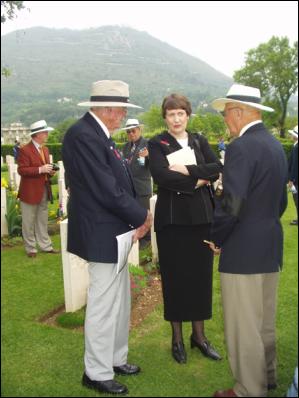
New Zealand Prime Minister Helen Clark graveside at the Cassino War Graves Cemetery, Monte Cassino.
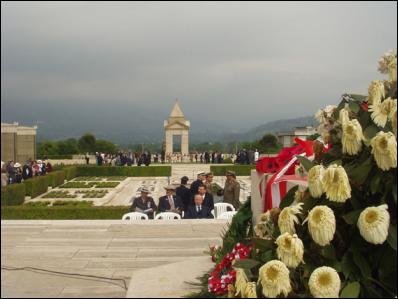
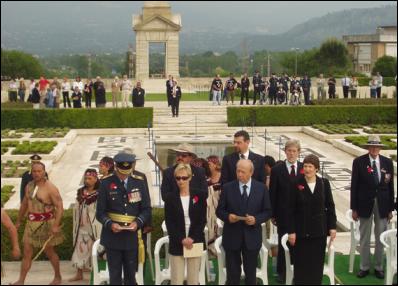

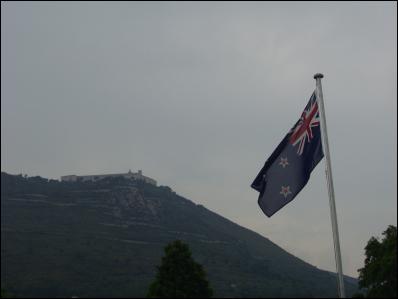
Maori resistance to conscription
Native Contingent
At the outbreak of war imperial policy did not allow 'native peoples' to fight in a war among Europeans. Permission was eventually granted for a Maori contingent to form part of New Zealand's war effort. A Native Contingent Committee co-ordinated Maori recruitment. The four Maori MPs, in particular Apirana Ngata and Maui Pomare, were key figures in this committee.
The Native Contingent Committee had set a quota of 150 recruits every four weeks. This quickly became a struggle to achieve. In the second and third drafts that sailed in September 1915 and February 1916 only a third were Maori – the rest were mostly Niueans and Rarotongans.
'We have our own King'
The Native Contingent Committee faced a lack of support from a significant sector of the Maori community. Many Maori from Taranaki, Ngati Maniapoto and the Tainui-Waikato regions did not respond to the call to fight for 'King and Country'. The events of the 1860s, when their land had been confiscated as punishment for being in rebellion against the British Crown, had left them questioning why they should now be expected to fight for the British.
Kingitanga leader Te Puea Herangi maintained that her grandfather, King Tawhiao, had forbidden Waikato to take up arms again when he made peace with the Crown in 1881. She was determined to uphold his call to Waikato to 'lie down' and 'not allow blood to flow from this time on'. Te Puea maintained that Waikato had 'its own King' and didn't need to 'fight for the British King'. If land that had been confiscated was returned, then perhaps Waikato might reconsider its position.
Maori blood cries out for utu
In trying to meet their quota some members of the Native Contingent Committee and the government tried to shame Maori into participation. Ngata pointed out that every letter he received from soldiers at the front asked for more reinforcements. His waiata 'Te Ope Tuatahi' praised those iwi who had already contributed and drew attention to those who had yet to serve.
Defence Minister James Allen made a direct appeal to Waikato pride in late 1916 when he urged Waikato Maori to 'save New Zealand from the fate of Belgium, and their women from being the sport of German bayonets'. At Waahi pa in November 1916 Allen told Waikato that 'if you fail now you and your tribes can never rest in honour in the days to come'.
Conscription extended to Maori
When conscription for military service was introduced in 1916 it was initially imposed on Pakeha only. Pomare and Ngata wanted it applied to Maori as a matter of self-respect. Maori blood had been spilt overseas, and Maori had a duty to respond; utu was required.
Having failed to persuade Waikato, Allen supported the extension of conscription to Maori in June 1917 but decided to apply it to the Waikato–Maniapoto land district only. As other tribes had volunteered and filled the first two contingents, some in official circles considered the application of conscription in this way to be fair. Allen knew that this was also where the heart of the resistance lay. The inclusion of Ngati Maniapoto caused an outrage. Their rate of enlistment was much higher than that of Pomare's own people from Taranaki, who were excluded from the ballot. There was a feeling that Pomare was exacting revenge on Ngati Maniapoto–Waikato for the defeats Taranaki had suffered at their hands in the 19th century.
To make matters worse, the government compiled the register for the ballot using information that had been gathered in complete confidence at the 1916 Census. This was a violation of the law but was apparently agreed to by the Maori MPs.
Waikato resist
Te Puea offered refuge at Te Paina pa (Mangatawhiri) for men who chose to ignore the ballot. Waikato were denounced as 'seditious traitors', while the revelation that Te Puea's grandfather had a German surname – Searancke – confirmed her status as a 'German sympathiser'. Te Puea pointed out that the Searanckes were at least four generations removed from their German origins and that the British royal family itself was German.
Colonel Patterson of the Auckland Military District wanted Te Puea punished and planned to goad her into making anti-conscription statements in front of reliable witnesses. This would allow her to be prosecuted under the War Regulations for 'inciting men not to enlist'. Others favoured a more cautious approach, fearing such action would simply increase her prestige. The government knew that under Te Puea's leadership the campaign was at least non-violent. In 1916 two Maori had been shot and killed by police attempting to arrest the Tuhoe leader Rua Kenana at Maungapohatu, in part for his active discouragement of Maori recruitment. The government did not want a repetition of this bloodshed.
Maui Pomare advised Allen that those at Te Paina were 'merely waiting to be taken to jail' and suggested a minimal show of force would suffice.
Arresting and punishing the objectors
A crowd greeted police when they arrived at Te Paina on 13 July 1917. They were escorted into the meeting house where they read out the names of those to be arrested. Nobody moved. Te Puea made it clear that she would not co-operate. The police waded into the crowd and began arresting men they believed to be on their list. Mistakes were made. Te Puea's future husband, 16-year-old Rawiri Katipa, was mistaken for his older brother; a 60-year-old was also arrested. Each of the seven men selected had to be carried out of the meeting house.
King Te Rata's 16-year-old brother, Te Rauangaanga, was also seized. Police stepped over the King's personal flag, which had been protectively laid before Te Rauangaanga, and this caused great offence to those gathered. Te Puea intervened, calming the shocked onlookers and blessing those seized. She told the police to let the government know she was afraid of no law or anything else 'excepting the God of my ancestors'.
The prisoners were taken to the army training camp at Narrow Neck, Auckland. Those who refused to wear the army uniform were subjected, like other objectors, to severe military punishments, including 'dietary punishments' (being fed only bread and water) and being supplied with minimal bedding. When this failed, some were sentenced to two years' hard labour at Mount Eden prison.
Te Puea supported those who had been arrested by bringing them food (which never seemed to reach the inmates) and attempting to visit those in prison. She was a source of great inspiration to the prisoners. One of those detained, Mokona, described how Te Puea would sit outside the prison and when men went to the whare mimi (toilet) they were able to catch a glimpse of her. This was enough to make them want to 'invent an excuse to go to the whare mimi. The fact that she was there gave us heart to continue.'
Resistance maintained to the end
Maui Pomare decided to make a direct appeal to Tainui and persuade them to abandon their resistance. This personal approach failed dismally. The fact that their men were now in prison merely hardened Tainui resolve. When Pomare attended a hui at Waahi pa in 1918, he was greeted with abusive haka composed specially for his visit. This culminated in the act of whakapohane (performers baring their buttocks in contempt for an unwelcome visitor).
Only a handful of Tainui men were ever put into uniform, and none of the Tainui conscripts were sent overseas. By 1919 only 74 Maori conscripts had gone to camp out of a total of 552 men called. When the war ended, those Maori in training were sent home, and all outstanding warrants were cancelled. What to do with the defaulters already in custody was a little trickier. Despite the military's objection, Cabinet decided in May 1919 to release all Maori prisoners. This decision was never made public because the government was determined not to treat other defaulters so leniently.
The imposition of conscription on the Waikato and Ngati Maniapoto people had long-lasting effects. The breach it caused was probably only restored with the Tainui Treaty settlement in 1995.
 Stumble It!
Stumble It!

2 Comments:
Hi. The first picture you have up top, with the 3 guys, can I use that?
you can reach me at mirror_image53@hotmail.com
Thanks,
Al
If anyone actually believes half of the comments you have written about the Māori race, it would be a worry. You seriously need to look at your own history and sort that out before actually contemplating writing about somebody else's culture. What a total waste of space this is!!
Post a Comment
<< Home